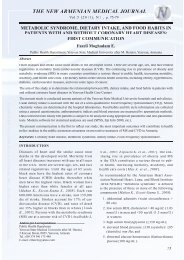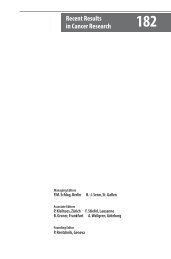Acute Leukemias - Republican Scientific Medical Library
Acute Leukemias - Republican Scientific Medical Library
Acute Leukemias - Republican Scientific Medical Library
You also want an ePaper? Increase the reach of your titles
YUMPU automatically turns print PDFs into web optimized ePapers that Google loves.
a References 103<br />
clear that homozygous carriers for one of the three<br />
TPMT mutant alleles experience severe myelotoxicity<br />
and increased risk of relapse due to treatment delays<br />
[128, 129]. Interestingly, patients with the mutated<br />
TPMT alleles have a significantly higher risk of developing<br />
secondary brain tumors if treated with whole-brain<br />
radiation [130]. Similarly, there was a trend towards increased<br />
risk of secondary AML in patients with decreased<br />
enzymatic activity [131].<br />
Similarly, single nucleotide polymorphism involving<br />
four of the enzymes involved in methotrexate metabolism<br />
have been implicated in increased relapse risk or<br />
toxicity in pediatric ALL patients: methylenetetrahydrofolate<br />
reductase [132–136], reduced folate carrier [137–<br />
139], thymidylate synthetase [140, 141], and methylenetetrahydrofolate<br />
dehydrogenase [136]. The results of<br />
these analyses are not always statistically significant;<br />
the discrepancies may be due to different patient populations,<br />
an assortment of treatment protocols and/or<br />
small patient numbers.<br />
6.6 Future Directions<br />
We believe that progress in cytogenetic and genetic dissection<br />
of ALL will lead to risk-adapted treatment in<br />
adult ALL as is already being accomplished for pediatric<br />
ALL. Currently, allogeneic transplantation in first remission<br />
is offered to adults with unfavorable karyotypes.<br />
The future promises a more refined approach, based<br />
on the information from genetic analyses, that will<br />
hopefully lead to improved outcome in adult ALL.<br />
References<br />
1. Bloomfield CD, Secker-Walker LM, Goldman AI, et al. (1989) Sixyear<br />
follow-up of the clinical significance of karyotype in acute<br />
lymphoblastic leukemia. Cancer Genet Cytogenet 40(2):171–185<br />
2. Fenaux P, Lai JL, Morel P, et al. (1989) Cytogenetics and their prognostic<br />
value in childhood and adult acute lymphoblastic leukemia<br />
(ALL) excluding L3. Hematol Oncol 7(4):307–317<br />
3. Walters R, Kantarjian HM, Keating MJ, et al. (1990) The importance<br />
of cytogenetic studies in adult acute lymphocytic leukemia. Am J<br />
Med 89(5):579–587<br />
4. Hématologique GFdC (1996) Cytogenetic abnormalities in adult<br />
acute lymphoblastic leukemia: Correlations with hematologic<br />
findings outcome. A Collaborative Study of the Group Francais<br />
de Cytogenetique Hematologique. Blood 88(7):3135–3142<br />
5. Secker-Walker LM, Prentice HG, Durrant J, Richards S, Hall E, Harrison<br />
G (1997) Cytogenetics adds independent prognostic infor-<br />
mation in adults with acute lymphoblastic leukaemia on MRC trial<br />
UKALL XA. MRC Adult Leukaemia Working Party. Br J Haematol<br />
96(3):601–610<br />
6. Faderl S, Kantarjian HM, Talpaz M, Estrov Z (1998) Clinical significance<br />
of cytogenetic abnormalities in adult acute lymphoblastic<br />
leukemia. Blood 91(11):3995–4019<br />
7. Chessells JM, Hall E, Prentice HG, Durrant J, Bailey CC, Richards SM<br />
(1998) The impact of age on outcome in lymphoblastic leukaemia;<br />
MRC UKALL X and XA compared: A report from the MRC Paediatric<br />
and Adult Working Parties. Leukemia 12(4):463–473<br />
8. Wetzler M, Dodge RK, Mrozek K, et al. (1999) Prospective karyotype<br />
analysis in adult acute lymphoblastic leukemia: The cancer<br />
and leukemia Group B experience. Blood 93(11):3983–3993<br />
9. Gleissner B, Rieder H, Thiel E, et al. (2001) Prospective BCR-ABL<br />
analysis by polymerase chain reaction (RT-PCR) in adult acute<br />
B-lineage lymphoblastic leukemia: Reliability of RT-nested-PCR<br />
and comparison to cytogenetic data. Leukemia 15(12):1834–<br />
1840<br />
10. Block AW, Carroll AJ, Hagemeijer A, et al. (2002) Rare recurring<br />
balanced chromosome abnormalities in therapy-related myelodysplastic<br />
syndromes and acute leukemia: Report from an international<br />
workshop. Genes Chromosomes Cancer 33(4):401–412<br />
11. Faderl S, Talpaz M, Estrov Z, O’Brien S, Kurzrock R, Kantarjian HM<br />
(1999) The biology of chronic myeloid leukemia. N Engl J Med<br />
341(3):164–172<br />
12. Kantarjian HM, Talpaz M, Dhingra K, et al. (1991) Significance of<br />
the P210 versus P190 molecular abnormalities in adults with Philadelphia<br />
chromosome-positive acute leukemia. Blood 78(9):<br />
2411–2418<br />
13. Westbrook CA, Hooberman AL, Spino C, et al. (1992) Clinical significance<br />
of the BCR-ABL fusion gene in adult acute lymphoblastic<br />
leukemia: A Cancer and Leukemia Group B Study (8762). Blood<br />
80(12):2983–2990<br />
14. Melo JV, Gordon DE, Tuszynski A, Dhut S, Young BD, Goldman JM<br />
(1993) Expression of the ABL-BCR fusion gene in Philadelphia-positive<br />
acute lymphoblastic leukemia. Blood 81(10): 2488–2491<br />
15. Lim LC, Heng KK, Vellupillai M, et al. (1999) Molecular and phenotypic<br />
spectrum of de novo Philadelphia positive acute leukemia.<br />
Int J Mol Med 4(6):665–667<br />
16. van Rhee F, Hochhaus A, Lin F, Melo JV, Goldman JM, Cross NC<br />
(1996) p190 BCR-ABL mRNA is expressed at low levels in p210-positive<br />
chronic myeloid and acute lymphoblastic leukemias. Blood<br />
87(12):5213–5217<br />
17. Secker-Walker LM, Craig JM, Hawkins JM, Hoffbrand AV (1991) Philadelphia<br />
positive acute lymphoblastic leukemia in adults: Age<br />
distribution, BCR breakpoint and prognostic significance. Leukemia<br />
5(3):196–199<br />
18. Rieder H, Ludwig WD, Gassmann W, et al. (1996) Prognostic significance<br />
of additional chromosome abnormalities in adult patients<br />
with Philadelphia chromosome positive acute lymphoblastic<br />
leukaemia. Br J Haematol 95(4):678–691<br />
19. Ko BS, Tang JL, Lee FY, et al. (2002) Additional chromosomal abnormalities<br />
and variability of BCR breakpoints in Philadelphia<br />
chromosome/BCR-ABL-positive acute lymphoblastic leukemia in<br />
Taiwan. Am J Hematol 71(4):291–299<br />
20. Gleissner B, Gokbuget N, Bartram CR, et al. (2002) Leading prognostic<br />
relevance of the BCR-ABL translocation in adult acute Blineage<br />
lymphoblastic leukemia: A prospective study of the Ger
















